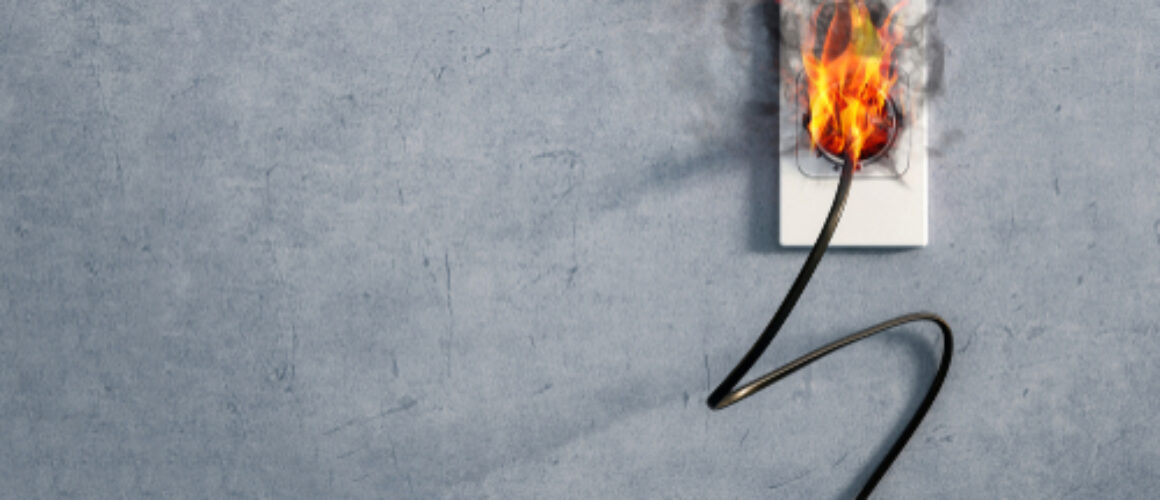Common Fire Hazards in the Home and How to Mitigate the Risks
Welcome to our informative blog post on common fire hazards in the home and how you can minimize the risks they pose. As a trusted supplier of electrical products, we at Electrical Discounted Supplies understand the importance of fire safety. In this article, we will explore different types of fire hazards and provide practical tips on how to mitigate them effectively. By being aware of these potential dangers and taking necessary precautions, you can ensure a safer environment for yourself and your loved ones.
What are Fire Hazards
Electrical appliances, such as overloaded power strips or frayed cords, can quickly become fire hazards. Always ensure that your electrical devices are properly maintained and never leave them unattended while in use.
Cooking equipment poses a significant risk of fire if not used carefully. Avoid leaving the stove or oven unattended, keep flammable items away from heat sources, and always use caution when handling hot oil or grease.
Heating sources like space heaters and fireplaces can also be potential fire hazards if not used cautiously. Maintain a clear space around heaters, regularly inspect chimneys for blockages and damage, and never leave heating appliances on overnight or when you’re away from home.
What type of Fire Hazards are there?
Electrical Fire Hazards: Faulty electrical equipment and errors in wiring can lead to a fire. Overloaded circuits, frayed cords, and outdated electrical systems are common sources of ignition.
Cooking Fire Hazards: Unattended cooking and grease buildup can quickly turn into a fire hazard. Flammable materials near stoves or ovens increase the risk of an accidental fire.
Heating Fire Hazards: Improper use or maintenance of heating equipment such as heaters or furnaces can result in fires. Combustible debris near heating appliances poses a significant threat.
Smoking Fire Hazards: Carelessly discarded cigarette butts or ash may easily ignite flammable materials present in the surroundings, leading to disastrous consequences.
Candle Fire Hazards: Unattended candles pose a high risk for accidental fires. Flames close to combustible objects like curtains or paper create dangerous situations.
Fire hazards exist throughout various areas within our homes, including bedrooms, bathrooms, garages, and attics. Awareness about these potential risks is crucial for maintaining safety standards at home.
Electrical Fire Hazards
Faulty wiring, overloaded outlets, and damaged appliances are common electrical fire hazards that can lead to devastating consequences. Faulty wiring increases the risk of an electrical fire by causing sparks or short circuits. Overloaded outlets can overheat and ignite nearby combustible materials. Damaged appliances with frayed cords or faulty components pose a serious threat as they can generate sparks or cause electrical arcing. Regular maintenance, inspections, and prompt repairs are essential to mitigate these risks associated with electrical equipment in order to prevent fires.
Electrical Discounted Supplies provides expert guidance and high-quality products to help homeowners address these fire hazards effectively. Our range of reliable circuit breakers, surge protectors, and smoke/fire detectors ensures optimal protection against electrical fires caused by faulty wiring, overloaded outlets, or damaged appliances. Stay safe by choosing the right equipment for your home while reducing the risk of potential fire incidents related to electrical errors.
Cooking Fire Hazards
Unattended cooking poses a significant fire risk. Leaving food unattended on the stove can lead to overheating and combustion, resulting in a dangerous fire. Always stay in the kitchen while cooking and never leave the stove or oven unattended.
Another common fire hazard in the kitchen is grease buildup on stovetops. Grease is highly flammable and can easily catch fire if it comes into contact with an open flame or hot surface. Regularly clean your stovetop to remove any grease or debris that may accumulate.
Having flammable objects near the stove increases the risk of a cooking fire. Items such as paper towels, curtains, or plastic containers should be kept away from heat sources to prevent them from catching fire. Maintain a clear area around your stove free from any combustible materials for added safety.
Heating Fire Hazards
Improper use of space heaters can pose a significant fire hazard. Placing combustible items too close to the heater or using extension cords that are not rated for the electrical load can lead to fires. It is crucial to maintain a safe distance and follow the manufacturer’s instructions when using space heaters.
Blocked or damaged heating vents can increase the risk of fire in a home. Accumulated debris, dust, or other flammable materials in the vents can ignite when exposed to heat from the system. Regularly cleaning and inspecting heating vents helps prevent blockages and ensures proper airflow, reducing the potential for fires.
Malfunctioning furnaces are another common cause of residential fires. Over time, wear and tear on electrical components or equipment errors may result in a faulty operation that could lead to a fire outbreak within your home. It is essential to have regular maintenance performed by qualified professionals to detect any issues early on and mitigate these risks effectively.
Smoking Fire Hazards
Cigarette butts not properly extinguished can easily cause a fire. The smouldering embers can ignite nearby combustible materials, such as debris or flammable dust, leading to a dangerous fire hazard.
Smoking in bed or upholstered furniture areas poses a significant risk of starting a fire. Falling ashes or an improperly discarded cigarette can quickly ignite the bedding or upholstery, spreading flames throughout the room and endangering lives.
Igniting flammable materials with cigarettes is another common smoking-related fire hazard. Accidentally touching a lit cigarette to curtains, papers, or other flammable items can result in rapid combustion and the potential for widespread damage.
It’s crucial to remain vigilant when smoking and ensure all cigarette butts are fully extinguished before disposal. Avoid smoking in bed or near upholstered furniture areas where fires can easily start and spread. Always be cautious when handling lit cigarettes around flammable materials to prevent accidental ignition.
Candle Fire Hazards
Leaving candles unattended can lead to a potential fire hazard. It is crucial to always stay in the same room as a burning candle and never leave it alone.
Placing candles near flammable items increases the risk of fire. Keep candles away from combustible materials such as curtains or other fabrics to prevent accidents.
Burning candles too close to curtains or other fabrics can easily ignite them, causing a dangerous fire situation. Always maintain a safe distance between burning candles and any potentially flammable objects in your home.
Fire Hazards in the Bedroom
- Electrical equipment and wiring can pose a significant fire risk in the bedroom. Overloaded power outlets, frayed cords, and faulty electrical appliances increase the chances of an electrical fire.
- Combustible materials such as debris, dust, or flammable fabrics near heat sources like heaters or candles can easily catch fire if they come into contact with sparks or high temperatures. It’s crucial to keep these items away from potential ignition sources to minimize the risk of a bedroom fire.
Fire Hazards in the Bathroom
Fire Hazards in the Bathroom can be caused by electrical equipment malfunctions and combustible debris. Electrical errors or faulty wiring can lead to sparks and ignitions, while flammable items such as towels or curtains near heating sources can easily catch fire. It is important to keep the bathroom clean from dust and clutter, regularly check electrical appliances for any signs of damage, and ensure proper installation of lighting fixtures to prevent potential fire hazards.
Fire Hazards in the Garage
- Combustible debris and dust can accumulate in the garage, creating a fire hazard. It is important to regularly clean and remove any flammable materials to reduce the risk of fire.
- Electrical equipment and wiring errors pose another fire hazard in the garage. Faulty outlets, overloaded circuits, or damaged cords can all lead to electrical fires. Regular inspections and proper maintenance are essential for preventing these incidents.
Fire Hazards in the Attic
- Dust accumulation can pose a fire hazard due to its flammable nature.
- Overloaded electrical circuits and faulty wiring are common causes of attic fires.
- Combustible debris such as old boxes or insulation can fuel a fire.
- Incorrectly stored flammable materials contribute to the risk of fire in the attic.
How to Mitigate Fire Hazards
Install Smoke Detectors
- Having smoke detectors on every level of your house is crucial in preventing fire hazards.
- Proper placement and installation techniques ensure optimum functionality of smoke detectors. Place them near bedrooms, living areas, and kitchens for maximum coverage.
- Regular testing and maintenance are essential to ensure the effectiveness of smoke detectors. Test them monthly, replace batteries annually, and clean them periodically.
Use Fire Extinguishers
Different types of fire extinguishers are designed for specific uses. Water extinguishers are effective on Class A fires, which involve ordinary combustible materials like wood and paper. Foam or carbon dioxide (CO2) extinguishers can be used on Class B fires, which involve flammable liquids like gasoline and oil. Dry powder extinguishers are versatile and suitable for use on Class A, B, and C fires.
Proper technique is crucial when using a fire extinguisher in an emergency situation. Remember the acronym PASS – Pull the pin to unlock the nozzle, Aim at the base of the fire, Squeeze the handle to discharge the agent, Sweep from side to side until all flames are out. Regular inspection and maintenance of fire extinguishers is essential to ensure they will function properly when needed most. Check pressure gauges monthly, inspect for visible damage or corrosion annually, and recharge or replace as necessary.
Proper Electrical Maintenance
Checking for damaged or frayed wires regularly is crucial to prevent fire hazards. These damaged wires can easily spark and ignite a fire if left unattended. Additionally, it is important to avoid overloading electrical outlets and extension cords as this can lead to overheating and potentially cause a fire. To ensure the safety of your home, always hire a professional electrician for any electrical repairs or installations, as they have the expertise to handle these tasks safely and effectively.
Regularly inspecting for damaged or frayed wires prevents potential fire hazards. Avoid overloading outlets and extension cords to prevent overheating that could result in fires. Hiring professional electricians guarantees safe electrical repairs or installations.
Safe Cooking Practices
Never leave cooking unattended on the stove or oven. It only takes a few seconds for a fire to start, and leaving the kitchen can lead to disaster. Keep flammable materials away from heat sources while cooking. A simple mistake like placing a dish towel too close to the burner can quickly ignite and cause a fire. Use kitchen appliances properly to prevent electrical fires. Avoid overloading outlets, ensure cords are in good condition, and never use damaged or frayed wires.
- Always stay in the kitchen when cooking
- Keep flammable items at least 3 feet away from heat sources
- Do not overload outlets or extension cords
- Regularly check appliance cords for damage
Fireplace and Heater Safety
- Keep a clear area around the fireplace or heater, ensuring that there are no flammable materials nearby. This includes furniture, curtains, and decorations.
- Always use a protective screen in front of the fireplace to prevent sparks from escaping and causing a fire hazard. Additionally, make sure to turn off heaters when leaving the room or going to bed for added safety measures.
Smoking Safety Measures
- Never smoke in bed or while lying down.
- Always extinguish cigarettes completely and dispose of them safely.
- Avoid smoking indoors, especially near flammable materials.
Candle Safety Tips
- Always ensure that candles are placed on a stable and heat-resistant surface to prevent tipping or damage to surrounding objects.
- Keep flammable materials, such as curtains and paper, at least one foot away from lit candles to reduce the risk of fire.
Bedroom Fire Safety
Keep your bedroom safe from fire hazards by following these simple tips. First, avoid overloading electrical outlets and use power strips with surge protectors to prevent overheating. Second, never leave candles unattended and make sure they are placed on a stable surface away from flammable items. Finally, have a fire escape plan in place with clear pathways and ensure that smoke detectors are installed and working properly.
Ensure the safety of your bedroom by keeping it free from potential fire hazards. Avoid using extension cords for prolonged periods of time as they can easily overheat and cause fires. Additionally, regularly check all electrical appliances for any signs of damage or frayed wires to prevent short circuits. Remember to keep curtains away from heaters or radiators and always extinguish cigarettes completely in designated ashtrays rather than leaving them smouldering in waste bins. Stay prepared by having a working fire extinguisher within reach at all times.
Bathroom Fire Safety
- Frequently clean the bathroom to remove lint, dust, or other flammable materials.
- Avoid using open flames near combustible items like curtains.
- Ensure proper ventilation in the bathroom to prevent steam buildup that can cause fires.
Garage Fire Safety
Keep your garage free of clutter and store flammable materials in a safe place to prevent fire hazards. Ensure that electrical outlets are not overloaded and cords are not damaged or frayed. Regularly inspect and maintain any appliances or machinery in the garage to reduce the risk of electrical fires.
Practice proper storage for gasoline, propane tanks, and other hazardous materials by keeping them in approved containers away from sources of heat or open flames. Implement smoke detectors near the entrance to detect potential fires early on, allowing for quick response and minimizing damage.
Attic Fire Safety
Ensure adequate insulation and ventilation in your attic to prevent the risk of fire. Insulate electrical wiring properly to avoid overheating and potential ignition. Regularly check for any signs of damage or wear on electrical cables, especially around light fixtures and outlets.
Store flammable materials away from the attic, such as gasoline, paint thinners, or cleaning solvents. Keep the area clutter-free to minimize fire hazards. Install smoke detectors in your attic and test them regularly to ensure they are functioning correctly.
Remember that prevention is key when it comes to fire safety in your home’s attic – taking these precautions can greatly reduce the risk of a devastating fire occurring.




